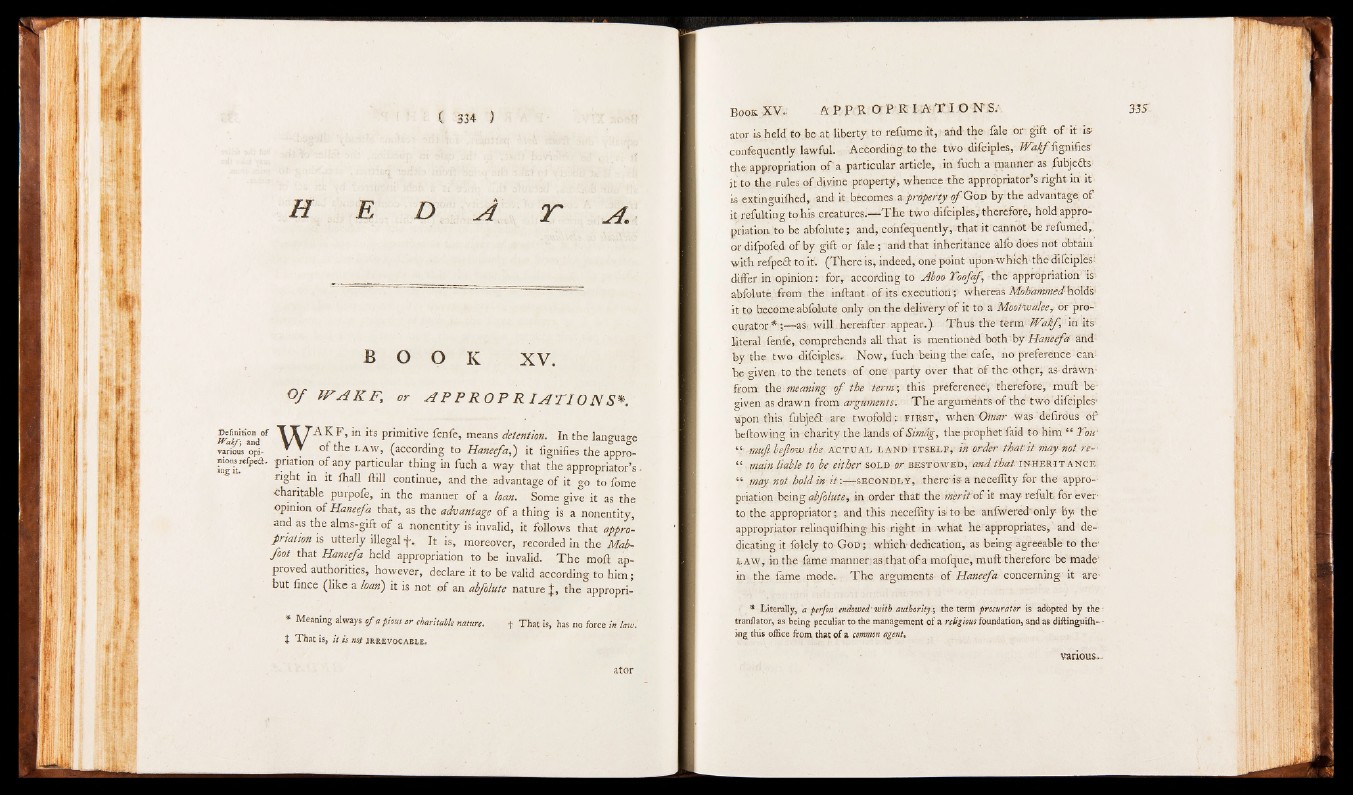
( 334 )
H E D J T 3
b o o k XV.
O f IF A K b\ or A P P R O P R I A T I O N S*.'
g g « " \ X 7 A K F > in its primitive fenfe, means detention. In the language
various opi- » ’ of the l a w , (according to Haneefa,) it fignifies the appro-
nion^fpea, priation of any particular thing in fuch a way that the appropriator’s
right in it fhall Hill continue, and the advantage of it go to lome
charitable purpofe, in the manner of a loan. Some give it as the
opinion of Haneefa that, as the advantage of a thing is a nonentity,
and as the alms-gift of a nonentity is invalid, it follows that appropriation
vs, utterly illegal •(-. It is, moreover, recorded in the Malt-
foot that Haneefa held appropriation to be invalid. The moil approved
authorities, however, declare it to be valid according to him;
but fince (like a loan) it is not of an abfolute nature J, the appropri-
* Meaning always of a piouso r c h a r ita b le n a tu r e . f That is, has no force in la w '.
t That is , i t i s n o t ir r e v o c a b l e .
B o o k X V . A P P R O P R I A T I O N S.
ator is. held to be .at liberty to refume it, * and the fale or gift of if is*
coai’cqucntiy lawful. Accordihg-.to the two dilciples,- JVakf fignihca
the appropriation of 'a particular article, in fuch a manner as i'ubjecb>
it to the rules of divine property, whence the appropriator’s right in it
is extinguilhed,, and it becomes z property o f G o d by the advantage of
it refulting tohis creatures;— T h e two difciplès,-therefore, hold appropriation
to be abfolute ; and, confequently, that it cannot be relumed,,
or difpofe,d of by gift or fale ; and that inheritance alfo d'oes not obtain
with refpedt to it. (Thereis, indeed,, one point upon-whichthedifeiplefei
differ.in opinion: fory: according to Aboo Toofàf, the appfbpfiation 'is’
abfolute from the: inftant. of its execution ; whereas Mohammed- holds*
it to become abfolute only on the delivery of it to. a Mootwdleer or procurator
—as- will, hereafter appear.). Thus the term ’W akf in its
literal fenfe, comprehends all that is- mentioned both :by Hahiefct and-
by the two difciples,. Now, fuch being the: cafe, :ho;preference';ean'-
be .given , to the tenets of one party over that of the other,.'as-dràwn-
ftom the meaning o f the term -, this preference, therefore, ' muft be'
given as drawn from arguments. The argumehis of the two difeiples»
upon this, fubjeâ- are twofold r first, when Omar was‘delirOus of'
bellowing in charity the lands, of Simdg, the prophet faid to-liim “ Tow
“ -nmjl bejiow the actual land itself, in order that-it may not, re--
“ main-liable to be either soLn or bestowed,. aWnta/iNHER-iTANCE
“ ynay' not hold secondly,, .thereis a neceffity for the appro--
priation being abfolute, in order that the merit of it may refult. for ever-
to the appropriator and this neceffity is to be anfwered' only by, the1
appropriator relinquilhing his right in what he appropriates, and dedicating
it folely to-G o d ; which-dedication, as being agreeable to the'
l a w , in the fame manner as that of a mofque, mull therefore be made'
in the lame mode.. T h e arguments- of Haneefa: concerning-; it are-
* Literally, a p erfo n en d ow ed• w ith a u th o r ity .; the term p r o c u r a to r is adopted by the
tranflator, as being peculiar to the management of a r e lig io u s foundation, and as diftinguiffi-
ing this office from that of a common A g en t,
various*